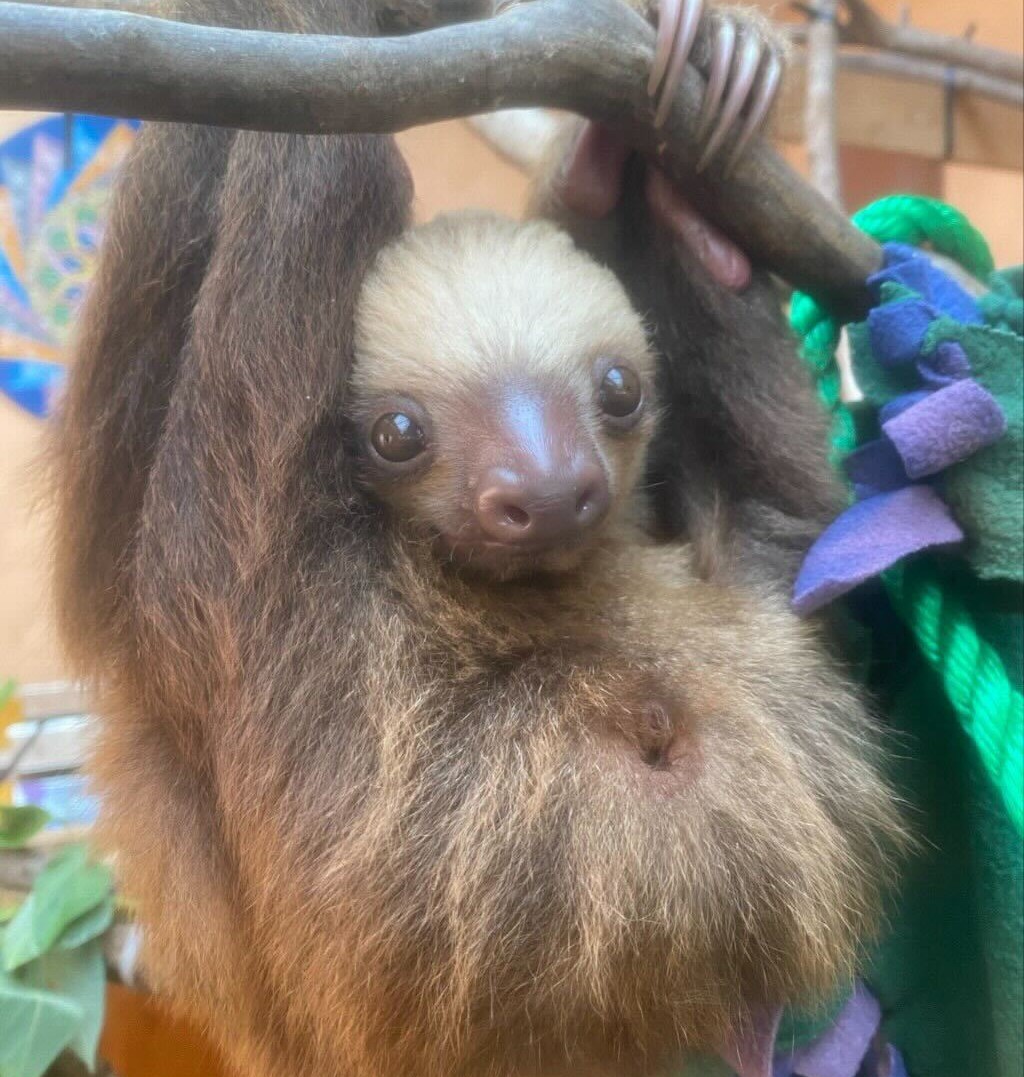Do sloths fart? Cute new video finally settles age old question
For years, it's been assumed that sloths don't fart. But new footage of a baby sloth letting rip in a water bath has shown that, contrary to popular belief, these tree-dwellers are actually incredibly gassy.
Get the world’s most fascinating discoveries delivered straight to your inbox.
You are now subscribed
Your newsletter sign-up was successful
Want to add more newsletters?
Join the club
Get full access to premium articles, exclusive features and a growing list of member rewards.
For years scientists assumed that sloths don't fart — believing the methane produced by their slow digestive system was simply absorbed into their bloodstreams and breathed out through their mouths. But now, researchers have captured what's likely the first-ever footage of a farting sloth.
The video, showing a baby Hoffman's two-toed sloth (Choloepus hoffmanni) letting rip in a bucket of water, was shared by zoologist and presenter Lucy Cooke (@luckycooke) and wildlife veterinarian Andrés Sáenz Bräutigam (@slothvet.ands) on Instagram on Tuesday (July 15).
"Yes, sloths do fart. And I may have just witnessed the first documented case," Cooke wrote in the post.
Cooke told Live Science that the "sloths don't fart" idea was popularized by biologist Dani Rabaiotti and researcher Nick Caruso's book "Does it Fart?: The Definitive Field Guide to Animal Flatulence" (Quercus Publishing, 2017), which highlighted sloths as the only mammals that don't fart.
"I always thought it curious that sloths would 'reabsorb' their intestinal gas into the blood stream, and then breathe it out," Cooke said in an email. "But the author is a biologist and her well-researched book was backed by academic references, which I also checked."
Related: Does It Fart? 10 Fascinating Facts About Animal Toots
But when Bräutigam, a vet at the Toucan Rescue Ranch in Costa Rica who has studied sloths for over a decade, Cooke that these tree-dwellers do indeed toot, she was not surprised. "It was hard to see the advantage of evolving such a torturous mechanism for release. It's not as if sloths have to worry about the social embarrassment of farting!" Cooke said.
Get the world’s most fascinating discoveries delivered straight to your inbox.

Bräutigam said that, contrary to popular belief, sloths are actually very gassy creatures. "Sloths are big fermenters and some of the biggest methane producers out there," he told Live Science via Instagram. "Some studies even claim that they can produce more gas than ruminants like cows (per kg of body weight, a cow is much heavier so they produce much more methane)."
Sloths are actually so gassy that it can make them difficult to study. "If you work with sloths you live with their gas, everywhere on X-rays, interfering with ultrasounds, it can actually be a huge concern," Bräutigam said. "They're so gassy that they even use their stomach gas to float when in the water."
In the wild, sloths mostly live off a diet of leaves, relying on bacteria in their guts to help them break it all down. However, in captivity their diet is often supplemented with vegetables, which Bräutigam said makes them even gassier. "If you [feed them] material that's easier to digest [like vegetables], the bacteria party it up and just create more and more gas," he said. "In this way, gas and the pressure associated with it can be a huge issue."
Unlike cows, which belch out most of their excess methane, sloths have an incredibly strong esophagus, which means they can't vomit or burp. But all this gas still needs to go somewhere. "We learnt that placing a sloth in a warm wet bath for a short time helps stimulate them to do their business and let all that gas loose," Bräutigam said.
And if you're wondering what sloth farts smell like, Bräutigam described them as "silent but deadly."
The finding shows that we still have a lot to learn about these slow-moving creatures. "It's an example of how even peer-reviewed science can get carried away with itself and a reminder that these slow-moving oddballs are still full of surprises. Sometimes quite literally," Cooke said.
A post shared by Lucy Cooke (@luckycooke)
A photo posted by on

Pandora is the trending news editor at Live Science. She is also a science presenter and previously worked as Senior Science and Health Reporter at Newsweek. Pandora holds a Biological Sciences degree from the University of Oxford, where she specialised in biochemistry and molecular biology.
You must confirm your public display name before commenting
Please logout and then login again, you will then be prompted to enter your display name.
 Live Science Plus
Live Science Plus










